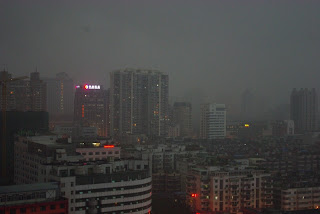"If a pauper were to leap from the parapet of this bridge each time we draw breath, we should live forever, because Nessus breeds and breaks men faster than we respire."
(Gene Wolfe, The Book of The New Sun)
The frightening sublimity of Wolfe's city of Nessus has often pushed my imaginative capabilities to their breaking point. A city of a thousand spans, towering to heaven and burrowing its roots deep beneath the dead earth: brim spilling over with people -an eternal city, perpetually being birthed to gasp its rattling death. To hold those spans of uncountable beings in the mind is beyond the limits of cognition.
I am finding this limit once and again here in my ancestral home of Fuzhou, China.
Fuzhou has roughly the same density as Houston (1423 persons / km2 vs 1505 persons / km2)
The difference: Houston is about 627 sq miles big, Fuzhou is 4702. A true urban sprawl.
The fantastical cityscapes of Wolfe's creation have arrived. They are here. I am living in one. A container for souls stretching exhaustively, stacked with people upon people, lives falling under lives. Here, each day I see the impossible dimensions of place crack open like the cruel smile of an endless labyrinth. The nauseating puzzle of flesh and concrete taunts me with its humming, tuneless song.
But most terrifying of all is to realize that the city looks not upon you as a stranger but as an intimate. We are these cities and they are us. We live in the teeth of the beast. We are the blood that colors its lidless eyes.
"Imagining infinity [is] easier than imagining very large finitudes"
(Timothy Morton, The Ecological Thought)
In the Book of The New Sun, Severian is spared from these maddening meditations of the horizonless mesh. He casts his mind outside of it, so that the strangeness of the undulating beast need not break his mind with its vast terribleness.
As I continue trying to think about ecology and mesh, this is the same sublimity which threatens to drive me to insanity. How can we take ethical action within the rippling fabric, if we cannot hold even the smallest part of it steady? My friend Ross is looking for some way to satisfy this question. What tools can we possibly find to unfix us from this paralysis -as we gaze into the widening gyre, the shriekingly silent gyre which slowly devours us. Where do we find strength to turn away from it, or scream, or even whimper?



No comments:
Post a Comment